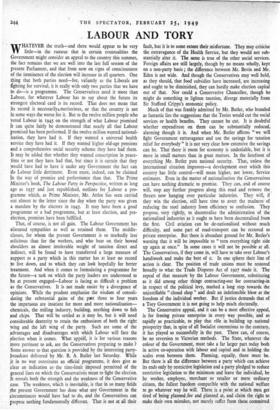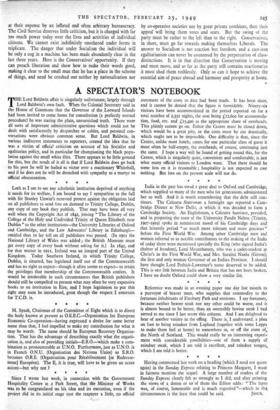LABOUR AND . TORY W HATEVER the truth—and there would appear to
be very little—in the rumour that in certain eventualities the Government might consider an appeal to the country this summer, the fact remains that we are well into the last full session of the present Parliament, and that from now on signs of consciousness of the imminence of the election will increase in all quarters. One thing that both parties need—for, valiantly as the Liberals are fighting for survival, it is really with only two parties that we have to do—is a programme. The Conservatives need it more than Labour, for whatever Labour has to say about the future its strongest electoral card is its record. That does not mean that its record is necessarily c meritorious, or that the country is not in some ways the worse for it. But to the twelve million people who voted Labour in 1945 on the strength of what Labour promised it can quite fairly be demonstrated that nearly all that Labour promised has been performed. If the twelve million wanted national- isation, they have had it. If they wanted a universal health service they have had it. If they wanted higher old-age pensions and a comprehensive social security scheme they have had them. It may be added that whether they wanted conscription in peace- time or not they have had that, but since it is certain that they would have had to have it under any Government the fact can do Labour little detriment. Even more, indeed, can be claimed in the way of promise and performance than that. The Prime Minister's book, The Labour Party in Perspective, written as long ago as 1937 and just republished, outlines for Labour a pro- gramme which, as Prime Minister, Mr. Attlee has seen carried out almost to the letter since the day when the party was given a mandate by the electors in 1945. It may have been a good programme or a bad programme, but at least election, and pre- election, promises have been fulfilled.
That, of course, is not all gain. The Labour Government has alienated sympathies as well as retained them. The middle- classes, for whom the present Government is so markedly less solicitous than for the workers, and who bear on their bowed shoulders an almost intolerable weight of taxation direct and indirect, will be found to have transferred a large measure of support to a party which in this matter has at least no record to live down, and to which they can look hopefully for better treatment. And when it comes to formulating a programme for the future—a task on which the party leaders are understood to be at present engaged—Labour is facing as difficult a problem as the .Conservatives. It is not made easier by a divergence of opinions. While the prudent emphasise the wisdom of consoli- dating the substantial gains of the past three to four years the impetuous are insatiate for more and more nationalisation— chemicals, the milling industry, building, anything down to fish and chips. That will be settled as it may be, but it will need considerable dexterity to retain the enthusiasm of both the right wing and the left wing of the party. Such are some of the advantages and disadvantages with which Labour will face the election when it comes. What appeal, it is for various reasons more pertinent to ask, are the Conservatives preparing to make ? Some answer to that question is provided by the interesting party- broadcast delivered by Mr. R. A. Butler last Saturday. While it in no way constitutes an official programme, it does give as 'clear an indication as- the time-limit imposed permitted of the general lines on which the Conservatives mean to fight the election. It reveals both the strength and the weakness of the Conservative case. The weakness, which is inevitable, is that in so many fields the present Government has done what any Government in the circumstances would have had to do, and the Conservatives can Propose nothing fundamentally different. That is not at all their fault, but it is to some extent their misfortune. They may criticise the extravagance of the Health Service, but they would not sub- stantially alter it. The same is true of the other social services. Foreign affairs are still largely, though by no means wholly, kept on a non-party basis ; the difference between Mr. Bevin and Mr. Eden is not wide. And though the Conservatives may well hold, as they should, that food subsidies have increased, are increasing and ought to be diminished, they can hardly make election capital out of that. Nor could a Conservative Chancellor, though he might do something to lighten taxation,' diverge materially from Sir Stafford Cripps's economic policy.
Much of that was frankly admitted by Mr. Butler, who branded as fantastic lies the suggestions that the Tories would cut the social services or health benefits. They cannot be cut. It is doubtful whether expenditure on them can be substantially reduced, alarming though it is. And when Mr. Butler affirms " we will fight Government extravagance and use the savings for taxation relief for everybody " it is not very clear how extensive the savings can be. That there is room for economy is undeniable, but it is more in small matters than in great matters. In the forefront of everything Mr. Butler puts national security. That, unless the international situation improves—a development over which this country has little control—will mean higher, not lower, Service estimates. Even in the matter of nationalisation the Conservatives can have nothing dramatic to promise. They can, and of course will, stop any further progress along this road and remove the threats now hanging over particular industries. They will, if they win the election, still have time to avert the madness of reducing the steel industry from efficiency to confusion. They propose, very rightly, to decentralise the administration of the nationalised industries as it ought to have been decentralised from the first. Civil aviation can be de-nationalised without much difficulty, and some part of road-transport can be restored to private enterprise. But there is abundant ground for Mr. Butler's warning that it will be impossible to " turn everything right side up again at once." In some cases it will not be possible at all. The Conservatives, if they come in, will have to take over Labour's handiwork and make the best of it. In one sphere their line of action is clear. The position of trade unions must be restored broadly to what the Trade Disputes Act of 1927 made it. The repeal of that measure by the Labour Government, substituting as it did among other things contracting-out for contracting-in in respect of the political levy, marked a long step towards the unjustifiable " closed shop " and dealt an indefensible blow at the freedom of the individual worker. But if justice demands that of a Tory Government it is not going to help much electorally.
The Conservative appeal, and it can be a most effective appeal, is for freeing private enterprise in every way possible, and as rapidly as practicable, to play that role in building up national prosperity that, in spite of all Socialist contentions to the contrary, it has played so successfully in the past. There can, of course, be no reversion to Victorian methods. The State, whatever the colour of the Government, must take a far larger part today both in active co-operation with labour and capital and in holding the scales even between them. Planning, equally, there must be. But there is all the difference between a party which can achieve its ends only by restrictive legislation and a party pledged to reduce restrictive legislation to the minimum and leave the individual, be he worker, employer, merchant or retailer or mere ordinary citizen, the fullest freedom compatible with the national welfare to go whatever way he will. There is a point at which men get tired of being planned for and planned at, and claim the right to make their own mistakes, not merely suffer from those committed at their expense by an inflated and often arbitrary bureaucracy. The Civil Service deserves little criticism, but it is charged with far too much power today over the lives and activities of individual citizens. We cannot exist indefinitely smothered under forms in triplicate. The danger that under Socialism the individual will be only a cog in a machine has been made abundantly clear in the last three years. Here is the Conservatives' opportunity. If they can preach liberation and show how to make their words good, making it clear to the small man that he has a place in the scheme of things, and need be crushed out neither by nationalisation nor by co-operative societies nor by great private combines, then their appeal will bring them votes and seats. But the swing of the party must be rather to the left than to the right. Conservatives, in short, must go far towards making themselves Liberals. The answer to Socialism is not reaction but freedom, and a cast-iron egalitarianism can never be countered by the perpetuation of class- distinctions. It is in that direction that Conservatism is moving and must move, and so far as the party still contains reactionaries it must shed them ruthlessly. Only so can it hope to achieve the essential aim of peace abroad and harmony and prosperity at home.



































 Previous page
Previous page